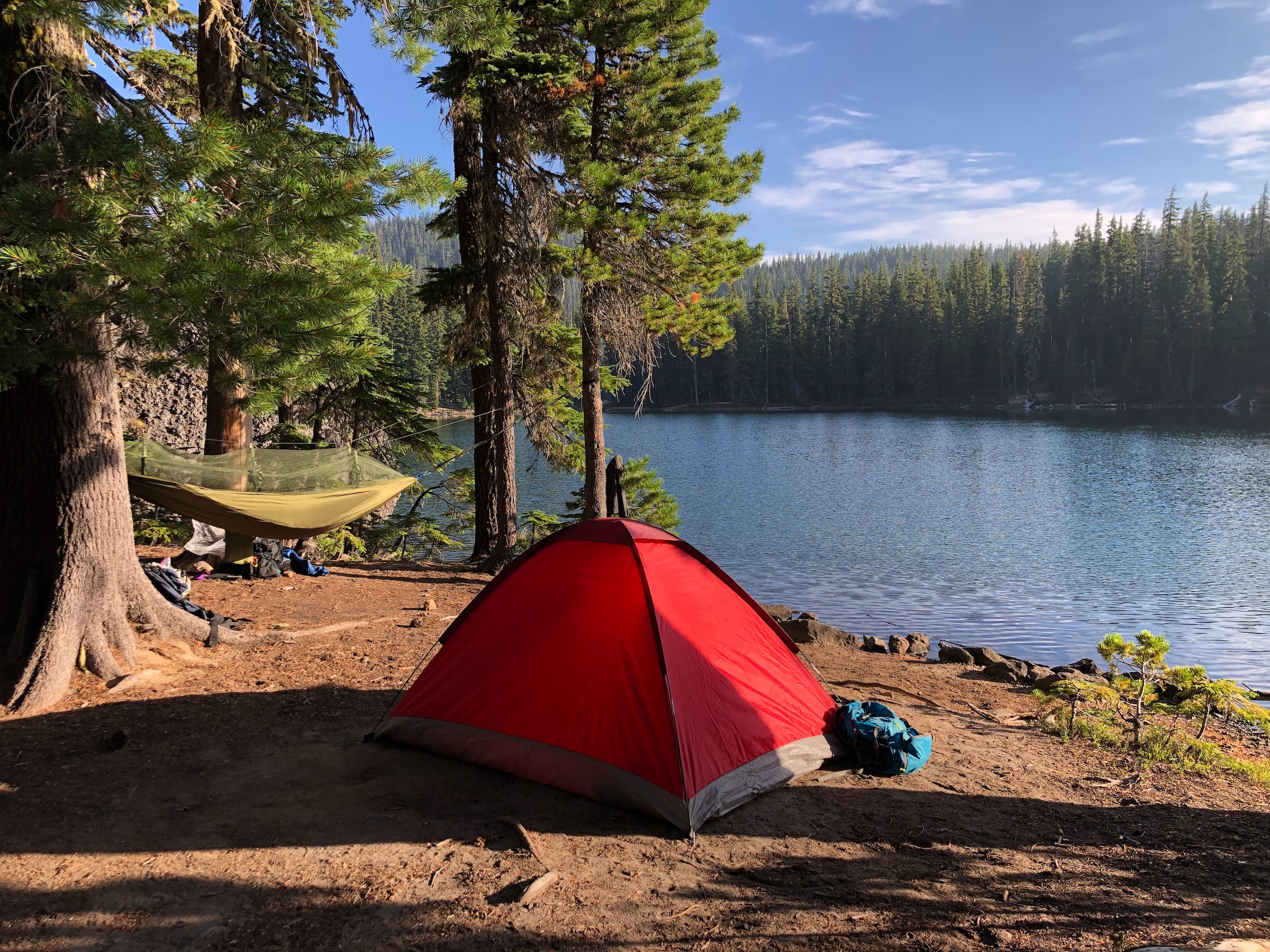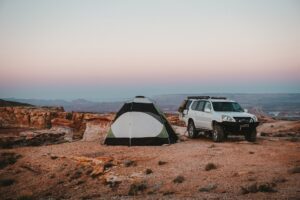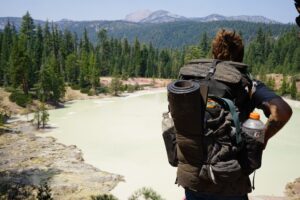
Camping vs Backpacking
When it comes to exploring the great outdoors, two popular options are camping and backpacking. While both allow you to escape the hustle and bustle of city life and immerse yourself in nature, they each have their unique pros and cons. In this blog post, we’ll compare camping vs. backpacking and cover the different ways to do that, such as bike-backing, and thru-hiking.
Camping

Camping, also known as car camping, is perfect for spending quality time with family and friends while enjoying nature’s beauty. Planning a camping trip is a breeze, and many campgrounds offer amenities like showers, restrooms, and even electrical hookups. You can drive your car up to the campsite with all your gear and entertainment so it’s a great option if you prefer a more leisurely experience and don’t want to carry everything on your back. That means you can bring along heavier gear, such as more heavy-duty stoves and tents to be able to cook for more people and sleep in a more luxurious setting. And if you’re feeling adventurous, there are often hiking trails nearby to explore on foot.
Although camping can be a lot of fun, it’s important to keep in mind that some campgrounds can get pretty crowded and noisy. If you’re looking for a more secluded experience, camping might not be the best option. Additionally, you’re restricted to the campsites that are accessible by vehicle, so you might miss out on some truly breathtaking views. Heavy-duty and durable equipment can be pricey, but it’s an investment that will pay off in the long run.
Pros:
- It’s a more relaxed way to enjoy the outdoors, with amenities such as showers, restrooms, and electricity available at some campsites.
- You can bring more gear and food, making it a more comfortable experience.
- It’s a great way to spend quality time with family and friends.
Cons:
- You’re limited to staying in designated campgrounds, which can be crowded and noisy.
- You might not feel as immersed in nature as you would when backpacking.
- You have to carry all your gear from your vehicle to your campsite, which can be a hassle.
Backpacking

Backpacking, also known as tent camping, is a more adventurous and immersive way to explore nature. It involves carrying all your gear on your back and hiking to a remote location to set up camp. Away from the hustle and bustle of campgrounds, backpacking allows you to experience the beauty of nature in a more intimate and secluded way. While backpacking can be challenging, it’s also incredibly rewarding. It allows you to push your limits and feel a sense of accomplishment. Backpacking has proven to be very good for your health. Plus, backpacking with a group of friends is an amazing bonding experience that you’ll cherish for years to come.
While backpacking can be an amazing experience, it’s important to remember that it takes a bit more planning, preparation, and physical endurance than camping. You’ll need to pack and carry all of your gear, including your tent and stove, which can be pretty exhausting. Fortunately, there are lightweight options available to help lighten your load. Keep in mind, though, that every piece of gear you bring will add up. Another thing to consider is that backpacking often involves long hikes, which might not be the best option for families with young children. That being said, it’s possible to meet up with loved ones at designated campsites to share stories and celebrate your achievement.
Pros:
- You can experience nature in a more immersive way, as you are away from the crowds and distractions of civilization.
- You can hike to more remote locations and see breathtaking views that you wouldn’t see when camping.
- It’s a great way to challenge yourself physically and mentally.
- You can do it with a group of friends to make memories for a lifetime
Cons:
- You have to carry all your gear on your back, which can be heavy and tiring.
- You have to be in good physical condition to hike long distances.
- You have to be more self-sufficient, as there are no amenities available on the trail.
- Difficult to include small children due to long hikes.
Bikebacking

Bikebacking is a type of backpacking that involves traveling by bike to remote locations and setting up camp. It’s a great way to cover more ground and explore areas that would be too far to reach on foot. The bike supports more weight and allows you to carry more equipment but there are also some bike maintenance tools you’ll need to lug around. You can satisfy your biking needs and explore to great outdoors 2in1. It’s also great to have a group of friends to join the adventure and lift each others’ spirits.
Bike-backing requires a higher level of fitness and skill than traditional backpacking, long distances can wear you down and you might face some quite challenging trails. You are limited to bike-friendly trails since you probably don’t want to climb and carry your bike around for a long time. In addition to backpacking gear, you’ll need a bike, some backup parts, tools, and appropriate clothing for cycling, all of which might cost you a pretty penny.
Pros:
- You can cover more distance than hiking, making it a faster way to explore the outdoors.
- You can carry more gear than traditional backpacking, as your bike can handle more weight.
- You can experience the freedom of cycling while still enjoying the simplicity of backpacking.
Cons:
- You need to have a good quality bike and cycling gear, which can be expensive.
- You need to have good cycling skills, as some trails can be technical and challenging.
- You have to carry more gear than traditional backpacking, which can be heavy and affect your cycling ability.
Thru-Hiking

Thru-hiking is a long-distance hiking activity where a person hikes a long trail end-to-end within a single hiking season and typically requires hiking for several months and covering thousands of miles. It’s a challenging and rewarding experience that requires extensive planning and preparation. Thru-hiking allows you to experience the beauty of nature in a unique and profound way.
Thru-hiking is not for the faint of heart. It will put your physical and mental endurance to the test. It could turn out quite an expensive undertaking if the target trail is long and you’ll need a lot of equipment. If you tackle a trail solo, as many do, it might become lonely after a long time. On the flip side, you might meet new and interesting people along the trail.
Pros:
- You can experience the satisfaction of completing a long-distance hike, which can be a life-changing experience.
- You can see the beauty of the wilderness in a way that few people do.
- You can challenge yourself both physically and mentally.
Cons:
- Thru-hiking requires significant planning and preparation, as well as a high level of physical fitness and mental resilience.
- It can be expensive, as you need to carry all your gear and food with you for several months.
- It can be lonely, as you’ll be hiking alone for long stretches of time.
What is the difference between camping and backpacking?
The main difference is about how you reach your campsite. Camping involves driving your car to the campsite with all the equipment. Backpacking involves carrying all your equipment on your back and hiking to the desired campsite. Backpacking allows you to reach places you wouldn’t be able to go to with a vehicle.
Conclusion
In conclusion, whether you choose camping or backpacking, or one of the various types of backpacking, it’s important to choose the option that best fits your interests and physical abilities. Both offer unique and rewarding ways to escape into nature and leave the stress of everyday life behind.